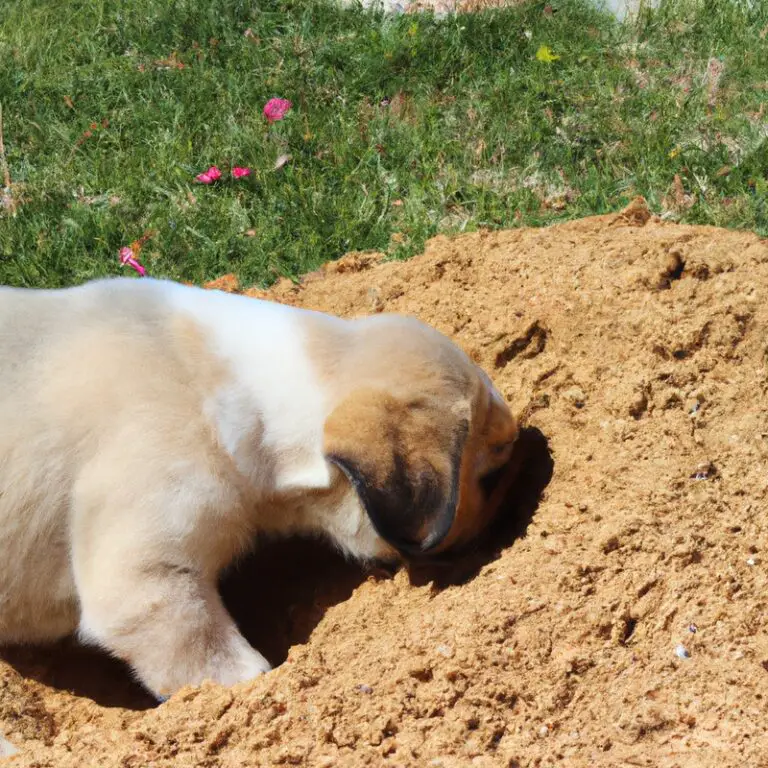Why Does My Dog Dig On My Bed When Excited: Unraveling Furry Bed-making Mysteries
Key Takeaways:
- Dogs may dig on your bed when excited as a natural instinct stemming from their predatory and denning behaviors.
- Digging can be a way for dogs to release excess energy and excitement, especially if they don’t have another appropriate outlet for it.
- Some dogs may dig on your bed as a way to seek comfort and security, as the soft surface may feel similar to a den or nest.
- Providing your dog with plenty of physical and mental stimulation, along with a designated digging area, can help redirect this behavior and prevent damage to your bed.
Have you ever walked into your bedroom, only to find your beloved dog enthusiastically digging on your bed? It’s a perplexing behavior, but fear not, because you’re not alone in this curious dilemma.
In this article, we will delve into the fascinating world of why dogs dig on beds when they’re excited.
From instinctual behaviors to marking territory, seeking comfort, and even attention-seeking behavior, there are multiple reasons why your furry friend may engage in this peculiar habit. But don’t worry, we’ll also explore effective strategies to stop this behavior and answer some frequently asked questions along the way.
So, let’s jump in and gain a deeper understanding of our canine companions!
| Reasons | Description |
| 1. Instinctual behavior | Dogs have a natural instinct to dig, which can be stimulated when they are excited or in a playful mood. This behavior is similar to their ancestors’ habit of digging dens for protection or to hide food. |
| 2. Attention-seeking | Digging on your bed might be an attention-seeking behavior. When your dog digs on your bed, they may receive attention from you or other family members, reinforcing the behavior. |
| 3. Comfort and familiarity | Your dog may find your bed comfortable and familiar. Digging on it could be a way for them to create a cozy spot or mark it with their scent, providing them with a sense of security. |
| 4. Energy release | Digging can be a way for dogs to release excess energy or excitement. When they’re feeling happy and energetic, digging can serve as a form of physical and mental stimulation. |
| 5. Anxiety or insecurity | In some cases, dogs may dig on beds as a result of anxiety or insecurity. This behavior might be a way for them to cope with stress or seek comfort from familiar scents and textures. |
| 6. Lack of proper exercise | Dogs that don’t receive enough physical and mental exercise may resort to digging as a way to entertain themselves or relieve boredom. Ensuring they receive adequate exercise and mental stimulation can help address this behavior. |
Why Do Dogs Dig on Beds?
Dogs may dig on beds due to instinctual behavior, marking territory, seeking comfort, lack of exercise or mental stimulation, anxiety or stress, or attention-seeking behavior.
1. Instinctual Behavior
1. Instinctual Behavior:
Dogs have a natural instinct to dig, which can be traced back to their ancestors.
Digging is an innate behavior that served various purposes in the wild, such as creating burrows for protection, finding food, or regulating their body temperature.
When your dog digs on your bed when excited, this behavior may be a manifestation of their instinctual drive to create a den-like space.
It’s their way of creating a comfortable and secure area for themselves.
Understanding and addressing this instinctual behavior can help you better manage and redirect their digging tendencies.
2. Marking Territory
Dogs have a natural instinct to mark their territory, and sometimes they may choose your bed as the place to do it.
This behavior is their way of claiming ownership and leaving their scent behind.
It’s a way of saying, “This is mine!” It can also be a way for them to seek comfort and security.
By providing them with alternative places to dig and marking their own territory, you can help redirect this behavior and protect your bed from further digging.

3. Seeking Comfort
3. Seeking Comfort
Dogs may dig on beds because they are seeking comfort. Your bed is warm and soft, providing a cozy spot for them to relax.
Digging is an instinctual behavior that dates back to their ancestors who would dig to create a comfortable sleeping area.
By digging on your bed, they are trying to create a comfortable spot to rest. Providing them with a designated sleeping area, such as a dog bed, can help redirect this behavior.

4. Lack of Exercise or Mental Stimulation
One possible reason why your dog might dig on your bed when excited is due to a lack of exercise or mental stimulation.
Dogs have a natural instinct to dig, and if they aren’t getting enough physical activity or mental challenges, they may turn to digging as a way to release excess energy or alleviate boredom.
To address this issue, try providing your dog with regular exercise and engaging activities such as puzzle toys or training sessions to keep their mind and body stimulated.

5. Anxiety or Stress
Dogs may dig on beds when they are experiencing anxiety or stress.
This behavior can be a way for them to release pent-up energy or find comfort.
If you notice your dog digging on your bed, it’s important to identify the underlying cause of their anxiety or stress.
It could be triggered by changes in their environment, separation anxiety, or fear.
Providing them with plenty of exercise, mental stimulation, and a calm and secure environment can help alleviate their anxiety and reduce this digging behavior.
6. Attention-Seeking Behavior
One reason why dogs may dig on your bed when they are excited is because of attention-seeking behavior. When a dog digs on your bed, it’s a way for them to get your attention and engage with you.
Dogs crave interaction and by digging, they are trying to initiate play or simply get your focus.
It’s important to provide your dog with proper attention and mental stimulation to prevent this behavior. Regular exercise, training, and interactive toys can help fulfill their need for attention and reduce the desire to dig on your bed.
7. Training and Management Tips
Here are 7 training and management tips to help you address your dog’s digging on your bed when they get excited:
- Provide an alternative: Give your dog their own designated digging area, such as a sandbox or a designated spot in the yard.
- Redirect their energy: Engage your dog in mental and physical activities, like puzzle toys or training games, to keep them stimulated and tire them out.
- Establish boundaries: Use positive reinforcement and consistent training to teach your dog what areas are off-limits, including your bed.
- Provide a comfortable resting place: Make sure your dog has a cozy and comfortable bed of their own, so they are less likely to seek out yours.
- Secure your bedroom: Limit your dog’s access to your bedroom by closing the door or using a pet gate, especially when you know they are prone to digging.
- Supervise and distract: If you notice your dog starting to dig on your bed, redirect their attention with a well-timed toy or command, and praise them when they engage with it.
- Seek professional help: Consult a professional dog trainer or behaviorist to address any underlying issues causing the digging behavior and get personalized guidance.
How to Stop Your Dog from Digging on the Bed
Provide an alternative digging spot for your dog to redirect their behavior. Increase exercise and mental stimulation to help tire out your dog and reduce digging impulses.
1. Provide an Alternative Digging Spot
If your dog loves to dig on your bed when they’re excited, providing an alternative digging spot is a simple solution.
Create a designated area in your home or yard where your dog is allowed to dig freely.
Use a sandbox filled with soft sand or soil, and bury some toys or treats for them to discover.
Encourage them to use this spot by rewarding them with praise or treats when they dig there.
Remember to redirect their digging behavior to the designated area consistently to reinforce the behavior you want.
2. Increase Exercise and Mental Stimulation
Increasing exercise and mental stimulation is key to stopping your dog from digging on the bed. Here’s what you can do:
- Take your dog for regular walks or runs. Engaging in physical activity can help tire them out and reduce their urge to dig.
- Provide your dog with interactive toys and puzzles. These can keep their minds stimulated and provide an outlet for their energy.
- Engage in obedience training sessions with your dog. Training exercises not only mentally challenge them but also strengthen your bond and improve their overall behavior.
- Consider enrolling your dog in agility or obedience classes. These classes provide structured exercise and mental stimulation, and your dog will enjoy the social interaction as well.
Remember, a tired and mentally stimulated dog is less likely to engage in undesirable behaviors like digging on the bed.
3. Establish Clear Boundaries and Routines
Establishing clear boundaries and routines is key to preventing your dog from digging on the bed when excited.
Here’s what you can do:
- Set boundaries: Clearly communicate to your dog that the bed is off-limits. Use commands like “off” or “down” and redirect your dog to an appropriate place.
- Create a designated digging area: Provide your dog with an alternative spot to satisfy their digging instincts, such as a sandbox or a designated corner in the yard.
- Stick to a consistent routine: Dogs thrive on routine, so establish regular exercise, play, and feeding times. This helps reduce excessive excitement and provides a structured environment.
- Provide mental stimulation: Boredom can lead to destructive behaviors like digging. Keep your dog mentally stimulated with interactive toys, puzzle feeders, and training sessions.
With clear boundaries, a designated digging area, a consistent routine, and mental stimulation, you can help curb your dog’s digging behavior and preserve your bed.
4. Manage Anxiety and Stress
One important way to stop your dog from digging on your bed when excited is to manage their anxiety and stress.
Dogs often resort to destructive behaviors like digging when they are experiencing anxiety or stress.
To help manage these emotions, you can provide your dog with plenty of physical exercise, mental stimulation, and a safe and comfortable environment.
Additionally, you can use calming techniques such as positive reinforcement training, regular routines, and soothing music or scents.
By addressing your dog’s anxiety and stress, you can help prevent them from digging on your bed.
5. Seek Professional Help if Needed
If you’ve tried everything and your dog’s bed digging persists, it may be time to seek professional help. A professional dog trainer or behaviorist can assess the underlying causes of this behavior and provide you with specific strategies to address it.
They are trained to understand canine behavior and can offer personalized guidance based on your dog’s individual needs.
Don’t hesitate to reach out for expert assistance; they can make a world of difference in helping you and your dog overcome this challenge.
FAQ about Dogs Digging on Beds
1. Is it normal for dogs to dig on beds?
Yes, it is normal for dogs to dig on beds. Digging is a natural instinct for dogs and often serves a variety of purposes.
They may dig on beds to create a comfortable spot or nest, find a cooler surface, or simply release excess energy.
Providing your dog with an alternative, designated digging area can help redirect this behavior and protect your bed.
2. How can I determine if my dog is digging due to anxiety or excitement?
To determine if your dog is digging due to anxiety or excitement, pay attention to their body language and behavior.
If your dog appears tense, shakes excessively, or shows other signs of nervousness while digging, it might be due to anxiety.
On the other hand, if your dog seems playful, wags their tail, and jumps around while digging, it is likely due to excitement.
Observing their overall demeanor and considering any triggers or patterns can help you better understand the reason behind their digging behavior.
3. Can neutering or spaying help reduce my dog’s digging behavior?
Neutering or spaying your dog may help reduce their digging behavior. This procedure can help to stabilize hormone levels and reduce certain instinctive behaviors, such as digging.
However, it’s important to note that individual results may vary, and other factors like training, environmental enrichment, and exercise are also crucial in managing your dog’s overall behavior.
Consult with your veterinarian for personalized advice based on your dog’s specific needs.
4. Are certain breeds more prone to digging on beds?
Yes, certain breeds are more prone to digging on beds. Some of these breeds include Terriers, Dachshunds, and Huskies.
These breeds have innate instincts related to digging or burrowing, which can lead them to dig on beds.
It is important to provide appropriate mental and physical stimulation for these breeds to help curb their digging behaviors. Additionally, providing a designated digging area or providing them with interactive toys can redirect their digging instincts.
5. How long does it take to train a dog to stop digging on the bed?
Training a dog to stop digging on the bed can vary in length depending on the dog and the consistency of the training. It typically takes several weeks to a few months of consistent training to see improvement in the behavior.
The key is to consistently redirect your dog’s attention to an appropriate alternative, such as their own designated digging area or providing them with enough mental and physical stimulation to reduce their urge to dig.
Patience and consistency are key during this training process.
6. Can punishment be an effective method to stop this behavior?
Punishment is not an effective method to stop your dog from digging on your bed when excited. Dogs do not understand punishment in the same way that humans do, and it can lead to fear and anxiety rather than resolving the behavior.
Instead, focus on providing appropriate outlets for your dog’s energy and excitement, such as regular exercise and mental stimulation.
Redirect their attention to a more appropriate behavior when they start digging on the bed.
Final Verdict
There are several reasons why dogs may dig on beds when excited. It could be due to instinctual behavior, marking territory, seeking comfort, lack of exercise or mental stimulation, anxiety or stress, or attention-seeking.
To stop this behavior, provide an alternative digging spot, increase exercise and mental stimulation, establish clear boundaries and routines, manage anxiety and stress, and seek professional help if needed.
Remember, understanding the underlying cause and addressing it with patience and consistency is key. By implementing these tips, you can help your dog overcome this behavior and create a peaceful and comfortable environment for both of you.







